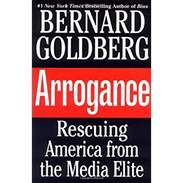
Insider Reveals How the Media Distort the News on Guns
By David Hayes
April 2018
This is the story of a long-time mainstream news reporter who turned against the orthodoxy of his colleagues and embraced legal ownership of guns.
Bernard Goldberg was long with CBS News, reporting regularly on the evening newscast. In a book published after retiring from CBS, he tells how most in his profession reported the 2002 story of Peter Odighizuwa opening fire with a handgun at the law school he attended. Every story reported that Odighizuwa was quickly subdued by some other students, cutting short Odighizuwa's rampage with three dead and another three wounded. A miniscule percentage of outlets mentioned that those who stopped Odighizuwa did so with their own guns.
Goldberg writes:
No matter whose count you use, the fact could not be more clear: Only a tiny handful of reporters in the entire country were willing to report an essential part of the story: that it wasn't just the killer who used a gun on campus that day, but the rescuers, too.
Goldberg concludes this despite his personal background which in his maturity he realizes prejudiced him against what he now regards as sound reasoning:
It's easy to conclude that the vast majority of those in the mainstream news media today are as Bernard Goldberg was before his belated examination of the arguments for what had been to him the other side. The passages above are part of a discussion of guns--particularly about the media's reporting about guns (make that: mis-reporting and distorting about guns)--which fills one chapter of Goldberg's book Arrogance: Rescuing America from the Media Elite. This chapter begins on pg. 185 of the hardback; the chapter is titled "And Now, the Rest of the Story".
By David Hayes
April 2018
This is the story of a long-time mainstream news reporter who turned against the orthodoxy of his colleagues and embraced legal ownership of guns.
Bernard Goldberg was long with CBS News, reporting regularly on the evening newscast. In a book published after retiring from CBS, he tells how most in his profession reported the 2002 story of Peter Odighizuwa opening fire with a handgun at the law school he attended. Every story reported that Odighizuwa was quickly subdued by some other students, cutting short Odighizuwa's rampage with three dead and another three wounded. A miniscule percentage of outlets mentioned that those who stopped Odighizuwa did so with their own guns.
Goldberg writes:
- "Many of those newspapers that failed to report the whole story then seized upon the horror at the Appalachian School of Law to editorialize once again against handguns."
No matter whose count you use, the fact could not be more clear: Only a tiny handful of reporters in the entire country were willing to report an essential part of the story: that it wasn't just the killer who used a gun on campus that day, but the rescuers, too.
Goldberg concludes this despite his personal background which in his maturity he realizes prejudiced him against what he now regards as sound reasoning:
- "I don't like to touch guns or smell them or feel them. ... So, unlike kids who grew up with guns in rural America, I never got close to a gun early on--and it carried over to my adult life. But I'll tell you this: It would be just fine with me if everyone on my block now had a gun or two at home, just to discourage criminals from even thinking about preying on the neighborhood."
It's easy to conclude that the vast majority of those in the mainstream news media today are as Bernard Goldberg was before his belated examination of the arguments for what had been to him the other side. The passages above are part of a discussion of guns--particularly about the media's reporting about guns (make that: mis-reporting and distorting about guns)--which fills one chapter of Goldberg's book Arrogance: Rescuing America from the Media Elite. This chapter begins on pg. 185 of the hardback; the chapter is titled "And Now, the Rest of the Story".
